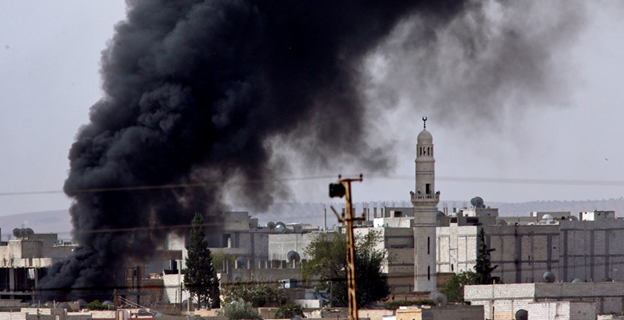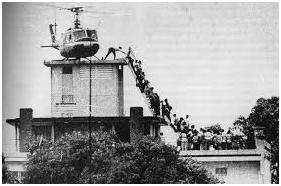Israel’s Contribution towards Defeating the Islamic State
Manfred Gerstenfeld, author of The War of a Million Cuts reviewed in the June 2015 New English Review, published a prescient essay mid-June in the Jerusalem Post. Gerstenfeld is the former Chairman of the Jerusalem Center for Public Affairs that sponsored a symposium on his new book on June 22, 2015. It was on the difficulty of “defeating”, let alone “degrading” the resilient Islamic State-the self declared Caliphate, “Will defeating Islamic State take more than a generation? “ While addressing the myriad of threats in the Middle East and potentially in the West from Islamic State Jihadis, Gerstenfeld draws attention to the contributions from Israel’s experience fighting asymmetrical wars against Islamic extremists seeking its destruction.

Tunisian Jihadi gunman Seifddine Rezgui. Photo by Rami Al Lolah
There was a trio of bloody spectacles inspired by the Islamic State on the first Friday in Ramadan. In France there was the beheading of an American owned chemical company executive by a Muslim employee. In Tunisia there was a massacre at a beach resort killing and injuring among others dozens of British, Belgian, Irish and German tourists by a Kalishnikov-toting attacker. In Kuwait there was the bombing of a Shia Mosque where several dozen at prayers were killed or injured .
In January there were the Charlie Hebdo and Hyper Casher Market attacks by Al Qaeda and ISIS inspired émigré Muslims that killed seventeen, including four French Jews and a Tunisian Jew. Last fall, we saw attacks in Sydney, Ottawa and Quebec. There were an ax attack injuring New York police officers and a beheading of food service employee at a company in Oklahoma City both perpetrated by converts to Islam. Last month we had the attack by two Jihadis from Phoenix who were killed in an attempted attack a Mohammed Cartoon event in Garland, Texas. One of the speakers at the event was Geert Wilders, the leader of the Dutch Freedom Party (PVV) who is under 24/7 protection of the Royal Dutch Protective service because of threats against his life for his anti-Islam views in the Netherlands and the EU.
Reuters reported Islamic State spokesman Muhammad al-Adnani urging brothers in the Muslim ummah in honor of the observances of Ramadan to undertake attacks on kaffirs, unbelievers, whether Christians, Shiites or Sunnis opposing the self-declared Islamic State. He declared in an audio message, Jihadists should turn the holy month of Ramadan, which began last week, into a time of “calamity for the infidels … Shi’ites and apostate Muslims.” Not lost on many is that June 29th marks the first anniversary of the Islamic State self declaration of a Caliphate by Abu Bakr al-Baghdadi.
Gerstenfield’s op-ed was triggered by comments from US General James Allen, commander of the US-led coalition combating the Islamic State in Syria and Iraq, suggesting that it might take a generation to defeat IS. Gerstenfeld wrote:
General Allen’s remarks, whether realistic or not, can serve for more detailed reflection on what it would mean if IS -controlled territory of a substantial size in say 20 years from now. This would indeed have a major impact on the world order, or better said world disorder. It would also have particular consequences for the Muslim world, the West, Russia and many other countries. Israel and the Jews, though minor players, would be affected by the global impact and by possible targeted attacks by IS.
As far as the Muslim world is concerned, the Arab Spring has already added Libya, Yemen and Syria to the roster of failed countries. The continued existence of IS may cause Iraq and possibly other countries to be added to that list. As the Islamic State is an extremist Sunni movement, it is directly opposed to Shi’ite Muslims, with no inclination to compromise. The longer the Islamic State lasts, the greater the threat to the Shi’ites.
That would mean that eventually the Islamic State would likely confront Iran, the leading Shi’ite country. Iran has been an international troublemaker and hardly any external forces have reacted to it militarily in the current century. The more powerful the Islamic State becomes, the more it will have to challenge Iran. As the Islamic State also opposes the Sunni countries presently ruled by various royal families, the instability in these countries would increase substantially as well. The same is true concerning Egypt.
[…]
The Islamic State calls for murder may bring with it a shift back toward terrorist attacks perpetrated by foreign jihadists. There have been threats and rumors of having them brought into Europe amongst the boat refugees arriving from Libya, or smuggled through the Balkans. … Yet if we speak about decades of sizable continued Islamic State activity, it is likely that there will be attacks from terrorists disguised as refugees.
[…]
Substantial Jihadi-caused terrorism in the West will lead to further stereotyping of all Muslims.
The previous massive influx of Muslims and its ensuing social problems, including the lack of successful integration, has already led to the rise and/or growth of anti-Islam nationalistic parties in various countries.
These include Geert Wilders’ Freedom Party (PVV) in the Netherlands, the Swedish Democrats, and above all, France’s Front National. Substantial Muslim terrorism is not only likely to increase the popularity of these parties but will influence the positions of other parties, who will have to compete for the votes of those with harder positions regarding Islam.
What would all this mean for Jews living abroad? Not much good. Attacks on others are often followed by attacks on Jews.
Gerstenfeld notes the ability of Israel to contend with extremist Salafist jihadi Islamic groups. Groups equipped with advanced weaponry supplied by Iran or Russian and U.S. weapons stocks abandoned by Assad forces in Syria or Iraqi National Forces:
No other country has accumulated as much experience in effectively fighting Muslim terrorists of various kinds as Israel. Israeli know-how in this field is already in demand and that is only likely to increase.
This fact is not well-publicized, but in future it should be, to improve Israel’s image with the Western mainstream populations.
A second opportunity may lie in Israel using the anti- Islamic State (IS) sentiment in the West to highlight that the majority Palestinian faction, Hamas, is not very different from IS. Israel hasn’t done much about this until now, but at the same time, the grounds for response from the West have been far less fertile than they may become in the future.
A third opportunity for Israel could be the possible change in political alliances in the Middle East. Some Arab states might consider that whatever hatred they promote of Israel to be less beneficial than allying them with Israel against IS, which has become a real threat to many Arab states. A recent poll showed that Saudis consider Iran to be their largest threat, followed by IS, and that Israel ranks third.
There has already been alleged secret meeting between Saudi military and Israeli security counterparts. Doubtless drawn together by the threat of a Shiite Mahdist Iran on the verge of becoming a nuclear threshold state destabilizing the Middle East. That is reflected in the Saudi undeclared war against the Houthi insurgency in the failed State of Yemen. An insurgency equipped and backed by Iran’s Revolutionary Guards Corps.
EDITORS NOTE: This column originally appeared in the New English Review. The featured image of Islamic State fighters is courtesy of PamelaGeller.com.



